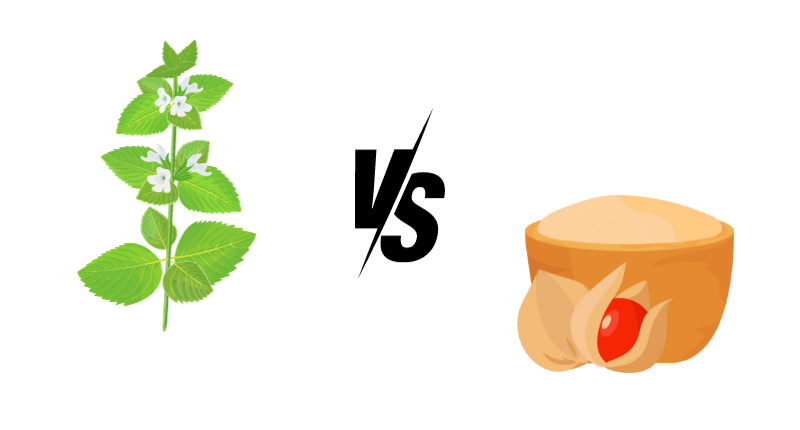In the bustling world of natural supplements, two herbs, in particular, have made waves in recent times: Handful of Ashwagandha and Lemon Balm. They all have abundant histories and a range of claimed health benefits .
Nevertheless, how would they come to the comparison of one another and how could they be combined?
It explores the particular histories, advantages and the possible mutual value of the both in this article.
CONTRASTING THE TWO: ASHWAGANDHA & LEMON BALM
Though they both are advertised for their anti-anxiety effects, they have different actions. Ashwagandha as an adaptogen, is able to assist the body to adapt to the stress and to keep normal physiological processes.
While peppermint affects the body as a stimulant, lemon balm basically works as a sedative.
THE COMBINATION OF HERBS PROVIDES THE UTILIZATION OF BOTH OF THEM
Specimens of each have their individual properties which might lead one to conclude that they should be combined. As such, the combination, in fact, seems promising in improving calmness making multiple-faceted stress to be handled. [1-10].
SCIENTIFIC SPOTLIGHT: BENEFITS OF ASHWAGANDHA
Various studies confirm the varied benefits of ashwagandha. The neurotransmitter GABA is present in ashwagandha, which helps reduce cortisol levels [4] and also has anti-inflammatory effects [5], and even aids in muscle growth [6]. Therefore, ashwagandha is a versatile supplement.
Beyond stress relief, Ashwagandha has shown promising effects in various spheres of health:
- Thyroid Regulation: Early works have shown that Ashwagandha may be useful in correcting the abnormal thyroid indices[^4^].
- Neuroprotection: It could be a protective influence against different kinds of degenerative diseases[^5^].
- Reproductive Health: The traditional approaches to fertility enhancement are now supported by the research of the modern times[^6^].
LEMON BALM’S IMPRESSIVE IMPACT
The primary scientific acknowledgement that lemon balm gets is the fact that it is “anxiolytic.” The investigation has demonstrated that it is one of Anxiety [7] and insomnia [8] symptoms relief ways.
Besides that its neuroprotective and cognitive-enhancing impacts are of major interest of current research as well [9].
The calming properties of Lemon Balm is just a small provision of it. Some of its less discussed benefits include:Some of its less discussed benefits include:
- Digestive Health: It has been clinically indicated for an alleviation of the digestive complaints for many years past[7].
- Antiviral Properties: The herbal medicine has anti-viral potency against several viruses with herpes simplex virus as the main target [8].
- Antioxidant Capacity: It may be cited as a reason for guarding against oxidative stress a forerunner of diverse illnesses [9].
ASHWAGANDHA AND LEMON BALM IN YOUR DIET ARE INCLUDED
In addition to taking supplements of these herbs, recipes that require the use of these herbs can also be a way of taking them. An ashwagandha-infused smoothie or lemon balm tea are also good options.
Health food fanatics, too might consider lemon balm pesto or ashwagandha latte as tasty additions to the meal.
THE TINCTURE TRUTH: WHY DR. ASHWA ME STANDS OUT
When shopping for Ashwagandha, consumers are often bombarded with a variety of choices: capsules, powders, and tinctures are forms.
These, however, come from the leading brands such as Dr. Ashwa Me. They are much more effective and powerful. Tinctures because of their liquid state absorb quicker and start working soon after ingestion [1].
Specifically, Dr. Ashwa Me’s ashwagandha tinctures are crafted with meticulous care, ensuring that consumers receive the herb’s full benefits.
HISTORICAL ROOTS OF ASHWAGANDHA
In its ancient Indian Ayurvedic roots goes Ashwagandha which is also known as Withania somnifera. Also known as the ” Indian Ginseng”, this adaptogen has through time been used in the treatment of numerous health problems like stress, inflammation and increasing vitality [2].
The adaptogenic properties make it a favourite among traditional cultures, as it helps individuals in adapting to both physical and emotional stress.
LEMON BALM: FROM CULINARY DELIGHT TO CALMING AGENT
The invasion of Lemon Balm (Melissa officinalis) was initially into Europe. In the beginning, very famous for his fragrant lemony smell, very quickly she found her place in kitchens.
On the other hand, lemon balm is not only a culinary herb but also a soothing agent. Therefore, lemon balm gained a wide range of uses for calming nerves and promoting sleep [3].
THE GLOBAL PIVOT TOWARDS NATURAL, HERBAL SUPPLEMENTS
Over the past few decades, the health and wellness paradigms, both locally and globally, have shown a radical change. More individuals, now more than ever, are leaning towards natural, herbal supplements and diets, consciously veering away from synthetic pharmaceuticals.
This concept which is a part of our traditional culture and also some emerging research, holds far-reaching consequences for the wellness and health industries of the future.
WHY THE SWITCH?
- Inherent Trust in Nature: Humans have depended on nature for health care services for the better part of human history. It has always been the way of “Vedic” sages of India to native “Americas shamans’” to turn to nature’s bounty to remedies . It is born trust that is coming along the generations thus herbal solutions are becoming more intuitive for many.
- Minimal Side Effects: The global shift away from the synthetic products towards herbal products is partly due to the lower probability of side effects. From a therapeutic point of view, chemical medication can be effective but it often comes with a rather long lists of possible side effects, which makes natural alternatives more appealing (for long-term-use).
- Holistic Healing: The herbal remedies and natural products generally take a holistic strategy. Instead, they approach the patient’s problem from the standpoint of the source and not merely the symptom, thus bringing about overall balance in the person’s body.
- Increased Research and Validation: Practical science nowadays is able to touch upon the sphere of traditional knowledge. Multiple researches now confirm the health benefits of herbs, allowing for the relevance and evolution towards natural remedies.
- Personal Empowerment: The natural wellness movement often goes hand in hand with self-education. End users are feeling empowered when they are aware of what they are consuming, and this has made many people to go for transparent, simple, herbal ingredient.
- Environmental Consciousness: With the rising consciousness of the environmental problems, more people get the choice of the sustainable and vegetarian alternatives. The herbal supplements, more often than not, which are ethically sourced, strike the right chord of the environmental paradigm.
- Cultural and Global Exchanges: The world is now more networked than ever. Westerners are getting acquainted with Ashwagandha from India or Matcha from Japan in the West. This worldwide knowledge transfer is what drives the increase in demand for different herbal supplements across the globe.
BENEFITS OF THIS HERBAL REVOLUTION
Here are some benefits:
- Strengthened Immunity and Resilience: Adaptogenic supplements in nature help an organism adapt to stress and significantly augment the overall resilience
- Improved Mental Well-being: They say that using natural substances like Lemon Balm and St. John’s Wort can improve mood and cognitive abilities [3].
- Long-term Health Prospects: An herbal-orienteds approach may achieve long-term, even if intangible, benefits, e.g., enhanced digestion, hormonal balance.
IN CONCLUSION
Lemon balm and ashwagandha are each very useful, and that is why. Whether your goal is to deal with stress, get better sleep or sharpen your cognitive skills, knowing the strengths of each herb and its possible synergy will help guide your choices.


